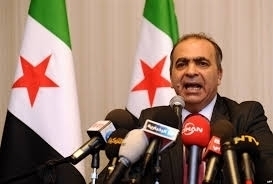The political, regional, international and military events related to the Syrian crisis are accelerating significantly; beginning with Russia’s failed attempts to tailor an opposition according to the regime's desires, through attempts to end Iranian regional domination, then with the dramatic military developments in the north, south and Qalamoun area, and finally with calls from UN Special Envoy to Syria to hold separate talks with a number of Syrian political figures and leaders of armed opposition factions on the one hand, and representatives of the tyrant of Damascus on the other.
These events suggest a regional and international restlessness towards the Syrian crisis and the continuous killing, destruction and transformation of Syria into a hotbed for extremism, which will soon pose a threat to the stability of the region.
But where is the role of the Syrian community and their cultural and political elites, and is it possible for the non-Syrians to preserve the unity of Syrians and enable them to regain Syria as a homeland?
It is clear that every country acts in its own interests to protect its national security as a priority, but the lack of experience in the diverse nature of Syrian society and the possible miscalculation of reactions – negatively or positively – in response to these actions might become a serious problem. Thus, Syrians who wish to maintain Syria as a homeland for all Syrians, those who wish to reconstruct it as a unified homeland for the next generations, must take responsibility and contribute in shaping the fate of their country and its future.
The apparent collapse of the regime’s military capacities – which led to its retreat on the southern and northern fronts – has been achieved through the flow of support from countries of the region that support the opposition and its fighters. Everyone is aware this is done without coordination with the Syrian opposition, which claims to be representative of the Syrian people and their revolution (both those who call themselves "internal opposition" or those consider themselves the "sole and legitimate representatives of Syrians").
The point being; that field progress is not accompanied by political plans and programs to assure Syrians of the future of their country. Even if there are programs, Syrians have no role in their development or implementation – they are unaware of the existence of these programs or their suitability in forming a new democratic Syrian state to ensure the dignity, freedom and rights of all Syrians. These programs – which the Syrians know nothing about – complicate the situation, while increasing the anxiety and confusion felt by Syrians of different political positions and diverse ethnic and sectarian sensitivities.
We all know the regime has always attempted to play on this sensitivity to prolong the tragedy and suffering of Syria’s people. The regime strengthened the role of extremist forces through military losses, allowing them to threaten Syrian minorities with subjugation under the swords of ISIS if the regime were to fall. Even through the use of countless non-Syrian sectarian organizations and militias against the Syrian people, the regime still claims and tries to advertise itself as the protector of religious freedom and cultural pluralism in Syria.
I believe it's time to do what cannot be postponed anymore; the Syrian political and cultural elites must issue a roadmap for a free, pluralistic and democratic Syria. The active, hardworking and courageous Syrian people deserve such a state; a Syria as it was before Assad's reign – a beacon of freedom, culture, science and labor.
Translated and edited by The Syrian Observer


